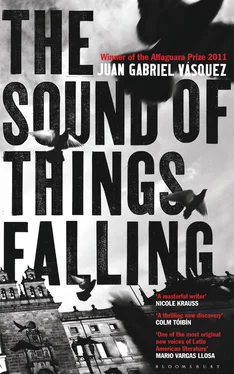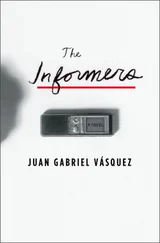I shouted to Laverde, but not because I already knew what was going to happen to him, not because I wanted to warn him of anything: at that moment my only ambition was to catch up to him, ask him if he was all right, perhaps offer my help. But Laverde didn’t hear me. I started to take bigger steps, avoiding people walking along the narrow pavement, which at that point is almost knee-high, stepping down onto the road if necessary to walk faster, and thinking unthinkingly: And they were one single long shadow , or rather tolerating the line like a jingle we can’t get out of our head. At the corner of 4th Avenue, the dense afternoon traffic progressed slowly in a single lane, towards the exit onto Jiménez. I found a space to cross the street in front of a green bus, whose headlights, just turned on, had brought to life the dust of the street, the fumes from an exhaust pipe, an incipient drizzle. That’s what I was thinking about, the rain I’d have to protect myself from in a little while, when I caught up to Laverde, or rather I got so close to him I could see how the rain was darkening the shoulders of his overcoat. ‘Everything’s going to be all right,’ I said: a stupid thing to say, because I didn’t know what everything was, much less whether or not it was going to be all right. Ricardo looked at me with his face contorted in pain. ‘Elena was there,’ he told me. ‘Was where?’ I asked. ‘On the plane,’ he answered. I think in a brief moment of confusion Aura had the name Elena, or I imagined Elena with Aura’s face and pregnant body, and I think at that moment I experienced a new feeling that couldn’t have been fear, not yet, but was quite similar to it. Then I saw the motorbike dropping down onto the road like a bucking horse, saw it accelerate to approach like a tourist looking for an address, and at the precise moment when I grabbed Laverde’s arm, when my hand clutched at the sleeve of his coat by his left elbow, I saw the faceless heads looking at us and the pistol pointed towards us as naturally as a metal prosthesis, and saw two shots, and heard the explosions and felt the sudden tremor in the air. I remember having raised my arm to protect myself just before feeling the sudden weight of my body. My legs no longer held me up. Laverde fell to the ground and I fell with him, two bodies falling without a sound, and people started to shout and a continuous buzzing appeared in my ears. A man came over to Laverde’s body to try to lift him up, and I remember the surprise I felt when another came over to help me. I’m fine , I said or remember having said, there’s nothing wrong with me . From the ground I saw someone else jump out into the road waving his arms like a castaway and standing in front of a white pick-up truck that was turning the corner. I said Ricardo’s name a couple of times; I noticed a warmth in my belly; the possibility occurred to me fleetingly that I’d wet myself, and I immediately discovered that it wasn’t piss soaking through my grey T-shirt. A short while later I lost consciousness, but the last image that I have is still quite clear in my memory: it’s that of my body lifted into the air and the effort of the men who put me into the back of the truck, who put me down beside Laverde like one shadow next to another, leaving on the bodywork a bloodstain, which at that hour, with so little light, was as black as the night sky.
I know, although I don’t remember, that the bullet passed through my gut without touching any organs but burning nerves and tendons and finally lodging itself in my hip bone a few inches from my spinal column. I know I lost a lot of blood and that, in spite of the supposed universality of my blood type, the stocks of it were low in the San José Hospital at the time, or its demand on the part of Bogotá’s afflicted society was too high, and my father and my sister had to donate some to save my life. I know I was lucky. Everyone told me so as soon as it was possible, and besides, I know, I know in an instinctive way. The notion of my luck, this I remember, was one of the first manifestations of my recovered consciousness. I don’t remember, however, the three days of surgery: they have disappeared completely, obliterated by the intermittent anaesthesia. I don’t remember the hallucinations, but I do remember that I had them; I don’t remember having fallen out of bed due to the abrupt movements that one of them provoked, and, although I don’t remember that they tied me down in the bed to prevent that from happening again, I do remember quite well the violent claustrophobia, the terrible awareness of my vulnerability. I remember the fever, the sweat that soaked my whole body at night and obliged the nurses to change the sheets, the damage I did to my throat and the corners of my very dry lips when I tried to yank out the respirator tube; I remember the sound of my own voice when I screamed and I know, although I don’t remember this either, that my screams disturbed the rest of the patients on the floor. The patients or their relatives complained, the nurses ended up moving me to another room, and in this new room, during a brief moment of lucidity, I asked about Ricardo Laverde and found out (I don’t remember from whom) that he had died. I don’t think I felt sad, or maybe I’m confusing, and always confused, the sadness at the news with the tears produced by pain, and anyway I know that there, busy as I was with the task of surviving, seeing the gravity of my own situation in the tattered expressions of those around me, I couldn’t have thought much about the dead man. I don’t remember, in any case, having blamed him for what had happened to me.
I did later. I cursed Ricardo Laverde, cursed the moment we met, and didn’t for a second even consider that Laverde might not have been directly responsible for my misfortune. I was glad he’d died: I hoped, as compensation for my own pain, that he’d had a painful death. Between the mists of my faltering consciousness I responded in monosyllables to my parents’ questions. You met him at the billiard club? Yes. You never knew what he did, if he was up to something fishy? No. Why was he killed? Don’t know. Why was he killed, Antonio? I don’t know, I don’t know. Antonio, why was he killed? I don’t know, I don’t know, I don’t know. The question was repeated insistently and my answer was always the same, and it soon became obvious that the question didn’t require an answer: it was more like a lament. The same night Ricardo Laverde was gunned down another sixteen murders were committed in diverse parts of the city and using diverse methods, and the ones that have stuck in my mind are that of Neftalí Gutiérrez, a taxi driver, beaten to death with a wheel wrench, and that of Jairo Alejandro Niño, an automotive mechanic, who received nine machete blows in a vacant lot on the west side. The Laverde crime was one of many, and it was almost arrogant or pretentious to believe that we were due the luxury of an answer.
‘But what had he done to get himself killed?’ my father asked me.
‘I don’t know,’ I told him. ‘He hadn’t done anything.’
‘He must’ve done something,’ he’d say.
‘But what does it matter now,’ my mother would say.
‘Well, yes,’ said my father. ‘What does it matter now.’
As I began surfacing, my hatred for Laverde gave way to a hatred for my own body and what my body was feeling. And that hatred that had myself as its object transformed into a hatred for everyone else, and one day I decided I didn’t want to see anybody, and I expelled my family from the hospital and forbade them from coming back to see me until my situation improved. ‘But we worry,’ said my mother, ‘we want to take care of you.’ ‘But I don’t. I don’t want you to take care of me. I don’t want anyone taking care of me. I want you all to go.’ ‘What if you need something? What if we can help you and we’re not here?’ ‘I don’t need anything. I need to be alone. I want to be alone.’ I want to sample silence, I thought then: a line from León de Greiff, another of the poets I used to listen to at Silva’s house (poetry accosts us at the most unexpected moments). Quiero catar silencio, non curo de compaña , I want to sample silence, I won’t be cured by companionship. Leave me alone. Yes, that’s what I said to my parents. Leave me alone.
Читать дальше












